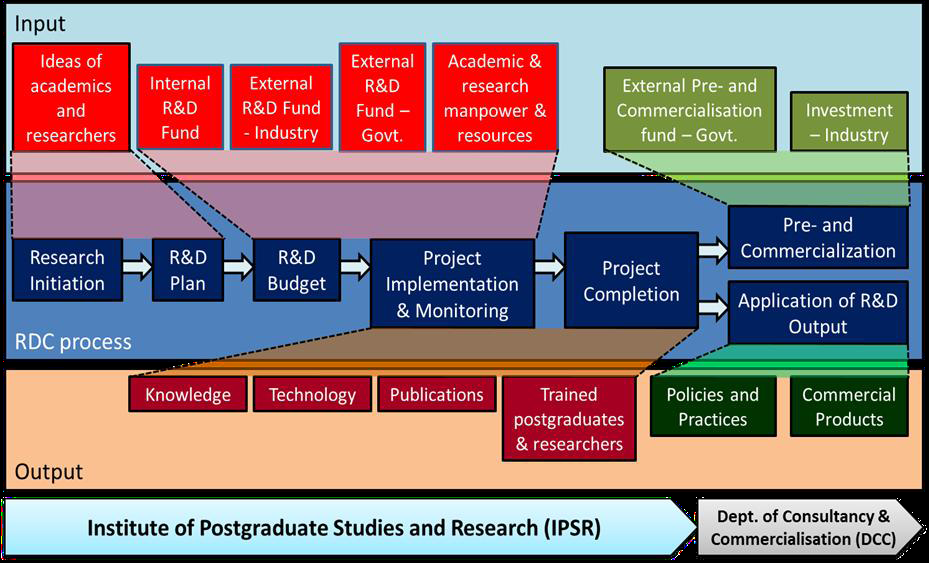
In the year 2019, Universiti Tunku Abdul Rahman (UTAR) continues to make progress and gain recognition as one of the leading research universities in Malaysia. This is the ninth annual report on Research & Development of the university. The Faculties, Research Centres and supporting units made significant progress in the year 2019 as can be seen in their respective reports.
In today‘s highly competitive and globalised environment, it is imperative that organisations such as universities continuously enhance their roles in knowledge and value creation to ensure their relevance to the economy and society. Research, development and commercialisation (RDC) thus become the key activities of universities. UTAR, being one of the many institutions of higher learning in the country, continues to focus and excel in RDC to ensure its long-term survival, relevance and recognition. UTAR has defined and continues to refine its direction and approach in transforming itself into a world recognised research-focused university.
.jpg)
.jpg)
To achieve worldwide recognition, it is imperative that UTAR focus and excel in research, development and commercialisation (RDC) activities. A 5-year research roadmap (2010 – 2014) for UTAR was defined and announced to the university community in August 2009.
The research roadmap is an outline of the important outcomes and the corresponding key performance indicators (KPIs), the recommended approaches and steps for UTAR to pursue in order to achieve Research University status as defined by the Ministry of Higher Education (MOHE) of Malaysia. Clear and measurable key performance indicators (KPIs) were defined and relevant benchmarks were set in the roadmap.
To perpetuate UTAR further into realising its goals, the "UTAR Research, Development and Commercialisation: Enhancement Strategy and Plan for 2013" encompassing detailed improvement plans for Human Resource Development, Research Funding, Postgraduate Programme Promotion and Intake, Data Management & Reporting and UTAR Internal Research Funding Allocation were drawn up and implemented accordingly. The initiatives introduced include UTAR Strategic Research Fund, UTAR Postdoctoral Research Scholarship Scheme, UTAR Research Publication Scheme and UTAR Undergraduate Research Scheme.
Since 2013, UTAR has continued to strengthen its pursuance of certain key milestones as set in the UTAR 10-year Strategic Plan (2013 – 2022). Strategies for each of the following 5 focused areas were formulated under the Research & Development Focused Area of the Strategic Plan.
UTAR R&D Colloquium 2019 (1.0) and (2.0) continued to be held to promote regular interactions among the research centres, to establish cross-disciplinary research co-operations and to bid for local and international research funding. This initiative is in line with one of the initiatives/action plans devised under Focus Area 3: Research and Development of the UTAR 10-year Strategic Plan 2013-2022 i.e. strengthening of Cross Disciplinary Research Centres which has resulted in two (2) collaborations submitted for UTAR Strategic Research Fund (UTARSRF) 2019 application.
Year 2019 saw further enhancements to the following policy and guidelines:
In UTAR, the relevant organisation structure, support and services are shaped and streamlined based on the research, development and commercialisation process chain as depicted in Figure 1.
Keysight Technologies Inc sponsored two students from the UTAR team, Lim Wen Qing and Au Jin Cheng for an all-expenses paid trip to New York covering the airfare, accommodation, meals and transportation, to present their invention at the finals before a team of judges.
In UTAR, the entire RDC process chain is handled by the following institute and department:
1. Institute of Postgraduate Studies and Research (IPSR);
2. Department of Consultancy and Commercialisation (DCC).
IPSR consists of two main units:
R&D management and the facilitation of postgraduate studies are two important aspects in every established research university. With both units managed under IPSR, UTAR hopes to achieve coherence and synergy between the two aspects such that greater and more significant output and impact can be generated. In recent years, IPSR has focused and worked on various facets of the RDC process chain to further enhance the processes and outputs in UTAR.

Figure 1: Process Chain, Input and Output for Research, Development and Commercialisation in UTAR
.jpg)
.jpg)
.jpg)
.jpg)
.jpg)
UTAR strongly believes that further steps should be taken to explore on how the findings and output of the project can be applied in real life. Hence, DCC takes on the task to look into the post-completion phase of research projects in UTAR. DCC continues to work closely with IPSR in year 2019 to further enhance the transition of research projects into commercialisation phase. Among the steps taken are as follows:
